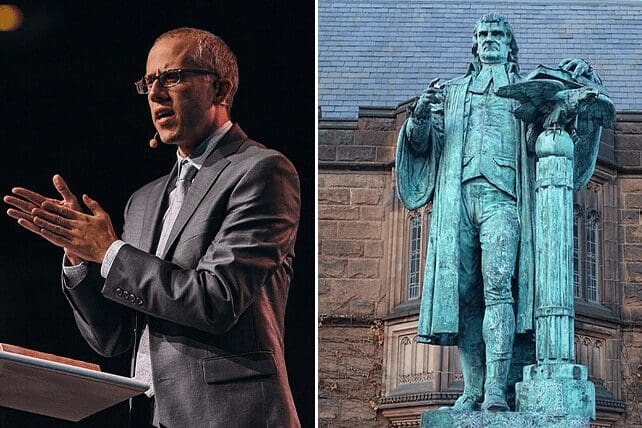Controversy surrounding a statue on the campus of Princeton University has sparked fresh debate about how evangelicals should remember significant figures in the movement’s history, their theology, and their complicity in the institution of slavery.
Installed in front of East Pyne Hall in November 2001, the statue in question depicts John Witherspoon (1723-1794), a founding father of America and influential leader in the history of Princeton University and the American church as a whole.
One of the signers of the Declaration of Independence, Witherspoon played a pivotal role in establishing the philosophical and political frameworks for what would become the United States of America.
Additionally, Witherspoon was a local church pastor, and he served as the sixth president of Princeton for a quarter of a century. He has been credited with bringing the school back from the brink of financial collapse. He was also the convening moderator of the First General Assembly of the Presbyterian Church in the United States of America.
RELATED: John MacArthur Touts the Benefits of Slavery in a 2012 Video That Has Resurfaced
He was also the slaveholder of two people.
Because Witherspoon was a slaveowner who advocated and voted against the abolition of slavery in New Jersey, a group of 300 people, consisting mostly of graduate students, are calling for the statue to be taken down.
Petitioners have proposed that the statue and commemorative plaque be replaced with a memorial that reflects on the different aspects of Witherspoon’s life and legacy.
Suggested language for the updated monument includes:
John Witherspoon, Princeton’s sixth president and founding father of the United States, had a complex relationship to slavery. Though he advocated revolutionary ideals of liberty and personally tutored several free Africans and African Americans in Princeton, he himself owned slaves and both lectured and voted against the abolition of slavery in New Jersey.
In response to calls to have the statue of Witherspoon removed from the Princeton campus, Princetonians for Free Speech, a group created by Princeton alumni in 2020, released a statement arguing that its removal “would have a deleterious effect on free speech, academic freedom, and viewpoint diversity.”
Additionally, pastor and theologian Kevin DeYoung authored a piece for the Princetonians for Free Speech titled, “John Witherspoon: President and Patriot.” In the article, DeYoung writes in defense of keeping the statue of Witherspoon intact, characterizing Witherspoon’s relationship with slavery as “complicated.”
RELATED: Survey: Confederate Memorials Still Divide Americans and Religion Is a Big Predictor
DeYoung, who earned his Ph.D. in Early Modern History focusing on the theology of John Witherspoon, is pastor of Christ Covenant Church, in Matthews, North Carolina. He is also a member of the leadership council at The Gospel Coalition. He has authored numerous books, and his work has also appeared in publications such as WORLD, 9Marks, and Desiring God.

